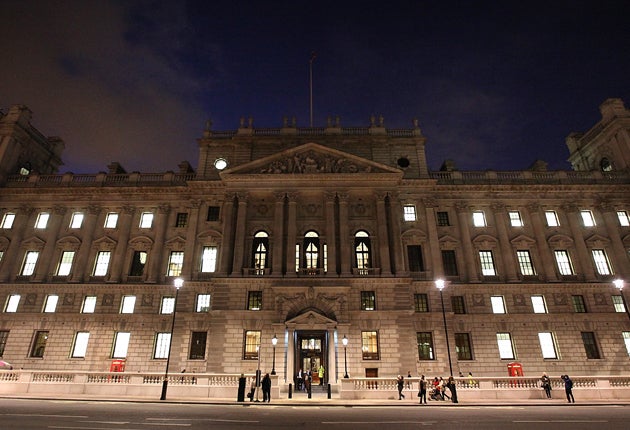Tax clampdown could net £2bn for Treasury

Your support helps us to tell the story
From reproductive rights to climate change to Big Tech, The Independent is on the ground when the story is developing. Whether it's investigating the financials of Elon Musk's pro-Trump PAC or producing our latest documentary, 'The A Word', which shines a light on the American women fighting for reproductive rights, we know how important it is to parse out the facts from the messaging.
At such a critical moment in US history, we need reporters on the ground. Your donation allows us to keep sending journalists to speak to both sides of the story.
The Independent is trusted by Americans across the entire political spectrum. And unlike many other quality news outlets, we choose not to lock Americans out of our reporting and analysis with paywalls. We believe quality journalism should be available to everyone, paid for by those who can afford it.
Your support makes all the difference.The Government will publish plans to close Corporation Tax loopholes today, which could help raise an extra £2bn for the exchequer over the next five years.
A series of measures are expected from Treasury minister David Gauke as part of government efforts to boost revenues by clamping down on tax avoidance. The plans will raise £2bn and protect another £5bn that was expected to be lost through avoidance, Mr Gauke will tell Parliament.
The move comes as savage public spending cuts are turning a spotlight on corporate taxation. The retail magnate Sir Philip Green was targeted at the weekend when activists picketed branches of the TopShop chain – owned by his Arcadia Group – to protest against the company's payment of a £1.2bn dividend to Sir Philip's wife, a resident of Monaco, five years ago. In Brighton, Sussex Police have charged one man in connection with the protests.
Similarly, in October, Vodafone was forced to close more than 30 of its shops when angry demonstrators protested that the government was allowing the mobile phone giant to avoid up to £6bn in unpaid taxes. Both waves of protests were organised by the UK Uncut "direct action" group.
Under the tax regime changes to be launched by Mr Gauke today – with immediate effect – companies will no longer be able to use intra-group loans or derivatives to reduce their tax bills.
Further measures will also be introduced as part of next year's Budget, including clamping down on disguised remuneration (such as designating essentially permanent staff as contractors), stopping investment companies retrospectively changing the currency used in their accounts for tax purposes, and tackling businesses that split supply of services to avoid VAT.
HM Revenue and Customs is also publishing its response to a consultation on bringing inheritance tax on transfers of property into trusts within the tax avoidance disclosure regime.
Mr Gauke is expected to characterise the proposals as part of the government's commitment to "fairness for taxpayers" and spreading the pain of austerity measures that will cut some £80bn out of public spending over the next four years.
The Government has also set up the Office of Tax Simplification and instituted plans to invest £900m in HMRC over the next four years, with a view to saving an estimated £7bn lost to avoidance, error and fraud.
A source at the Treasury said: "This Government is determined to provide fairness for taxpayers in ensuring everybody pays their fair share but also to provide certainty for business whose investment will encourage a re-balancing of the economy and job creation.
"These changes deal with longstanding loopholes which Labour failed to close," the source said. "Having looked closely at them, these changes are becoming a reality under the Conservative-Lib Dem Coalition."
While businesses support changes which address genuine law-breaking, they are wary of either extra complexity or moves which paint business as an easy target. But so far the Chancellor, George Osborne, has been broadly supported by the business community, not least for the pledge, made shortly after the May election, to cut corporation tax from 28 per cent to 27 per cent next April, and by a further 1 per cent each year thereafter until it reaches 24 per cent in 2014.
Join our commenting forum
Join thought-provoking conversations, follow other Independent readers and see their replies
Comments